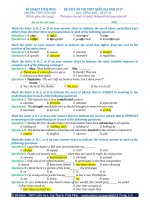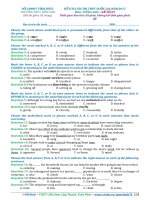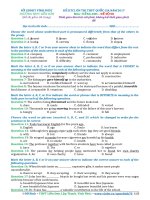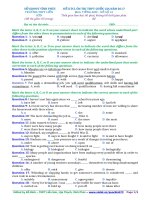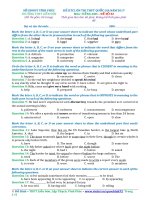DE LUYEN THI THPT QG 2017
Bạn đang xem bản rút gọn của tài liệu. Xem và tải ngay bản đầy đủ của tài liệu tại đây (90.01 KB, 8 trang )
<span class='text_page_counter'>(1)</span>SƠ GD&ĐT VINH PHUC TRƯƠNG THPT LIÊN SƠN (Đề thi gồm: 04 trang). ĐỀ KTCL ÔN THI THPT QUỐC GIA NĂM 2017 Môn: TIẾNG ANH – ĐỀ SỐ 34 Thời gian làm bài: 60 phút, không kể thời gian phát đề. Ho va tên thi sinh:……………………………………………………………………. SBD:………………………… Mark the letter A, B, C, or D on your answer sheet to indicate the word whose underlined part differs from the other three in pronunciation in each of the following questions. Question 1: A. achieves B. shakes C. draws D. plans Question 2: A. approached B. sacrificed C. unwrapped D. obliged Mark the letter A, B, C, or D on your answer sheet to indicate the word that differs from the other three in the position of primary stress in each of the following questions. Question 3: A. ancestor B. conical C. banquette D. verbalize Question 4: A. equivalent B. contractual C. inheritor D. mischievous Question 5: A. couple B. secure C. across D. attack Mark the letter A, B, C, or D on your answer sheet to indicate the underlined part that needs correction in each of the following questions. Question 6: Americans have begin leaning toward the idea that marriage is more of an option, rather than a milestone on the path to adulthood. A. have begin B. toward C. is D. on the path Question 7: Once you realize that there are ways to move on from awkward situations with grace and confidence, you’ll be on your way to embrace social interactions instead of dreading them. A. Once B. are C. embrace D. grace Question 8: Our brains are incredibly agile machines, and it’s hard to think of anything they do more efficient than recognize faces. A. are B. anything C. efficient D. recognize Question 9. Caroline refused taking the job given to her because the salary was not good. A. talking B. because C. was D. given Question 10. I finished college last year, and I am working here for only eight months now. A. only B. am working C, now D. Only Read the following passage and mark the letter A, B, C, or D on your answer sheet to indicate the correct word or phrase that best fits each of the numbered blanks. Many people today would like the traditional two-parent family back, that is to say, they want a man and a woman to (11)______ for life; they also think the man should support the family and the woman should stay home with the children. However, few families now (12)______ into this category. In fact, if more women decide to have children on their own, the single-parent household may become more typical than the traditional family in many countries. Also, unmarried couples may decide to have more children – or they might take in foster children or (13)______. And because people are staying single and living longer (often as widows), there may be more oneperson households. (14)______ the other hand, some people believe similar events happen again and again in history: if this is true, people may go back to the traditional (15)_____ or nuclear family of the past. Others think the only certainty in history is change: in other words, the structure of the future family could begin to change faster and faster and in more and more ways. Question 11: A. marry Question 12: A. belong Question 13: A. bring up Question 14: A. In Question 15: A. extended. B. wed B. crowd B. feel B. At B. extensive. C. engage C. group C. adapt C. On C. enlarged. D. gather D. fall D. adopt D. For D. big. Mark the letter A, B, C, or D on your answer sheet to indicate the word(s) CLOSEST in meaning to the underlined word(s) in each of the following questions. Question 16: For many people, business socialising is a very important aspect of working life but some people find it quite tricky, especially if English isn’t their first language..
<span class='text_page_counter'>(2)</span> A. strict B. difficult C. endurable D. ingenious Question 17: The puddles had coalesced into a small stream. A. cooled B. burned C. united D. exploded Question 18: The secretary left after weeks of harassment by the manager of her department. A. teasing B. irritation C. absence D. goading Mark the letter A, B, C or D on your answer sheet to indicate the word(s) OPPOSITE in meaning to the underlined word(s) in each of the following questions. Question 19: Peace between the two country was only transitory. A. foil B. courageous C. gusto D. perpetual Question 20: These plants are particularly susceptible to frost. A. antiquated B. immune C. obese D. Famous Read the following passage and mark the letter A, B, C, or D on your answer sheet to indicate the correct answer to each of the questions. The meaning of silence varies among cultural groups. Silences may be thoughtful, or they may be blank and empty when the individual has nothing to say. A silence in a conversation may also indicate stubbornness and resistance, apprehension, or discomfort. Silence may be viewed by some cultural groups as extremely uncomfortable; therefore, attempts may be made to fill every gap with conversation. Persons in other cultural groups value silence and see it as essential to understanding a person’s needs. Many American Indians have this latter view of silence, as do some traditional Chinese and Japanese persons. Therefore, when one of these persons is speaking and suddenly stops, what may be implied is that the person wants the nurse to consider the content of what has been said before continuing. Other cultures may use silence in yet other ways. For example, English and Arabic persons use silence for privacy, whereas Russian, French, and Spanish persons may use silence to indicate agreement between parties. Some persons in Asian cultures may view silence as a sign of respect, particularly toward an elder. Mexicans may use silence when instructions are given by a person in authority rather than showing the disrespect of disagreement. Nurses need to be aware of the possible meanings of silence so that personal anxiety does not promote the silence to be interrupted prematurely or to be nontherapeutic. A nurse who understands the therapeutic value of silence can use this understanding to enhance the care of clients from other cultures. Question 21: What does the author say about silence in conversations? A. It implies anger B. It promotes friendship C. It is culture-specific D. It is content-based Question 22: Which of the following people might regard silence as a call for careful thought? A. The Japanese B. The French C. The Mexicans D. The Russians Question 23: What does the author advise nurses to do about silence? A. Let it continue as the patient pleases B. Break it while treating patients C. Evaluate its harm to patients D. Make use of its healing effects Question 24: The word “essential” in the passage is closest in meaning to_________. A. necessary B. dispensable C. indicative D. insignificant Question 25: What may be the best title for the text? A. Sound and Silence B. What It Means to Be Silent C. Silence to Native Americans D. Speech Is Silver; Silence Is Gold Mark the letter A, B, C, or D on your answer sheet to indicate the correct answer to each of the following questions. Question 26: She jumped and shouted to draw_______ to herself. A. notion B. intention C. attention D. attraction Question 27: The marriage pattern of parents plays an extremely important role in______ marriage roles of children. A. social B. socialism C. socialist D. socializing Question 28: To their great fear, they found______ in the heaviest snowfall they had ever had. A. they were catching B. themselves caught C. they had caught D. themselves catching.
<span class='text_page_counter'>(3)</span> Question 29: ______ the distance was too far and the time was short, we decided to fly there instead of going there by train. A. Discovering B. To discoverC. To have discovered D. Discovered Question 30: It’s______ not to say “Thank you” when you are given something. A. informal B. easy C. rude D. polite Question 31: John is one of those people who I always believe do_______ best even in the most difficult situations. A. his B. my C. their D. your Question 32: “You don’t seem to be quite yourself today, Why?” – “I’m suffering from a cold. Nothing serious, ______.” A. yet B. though C. indeed D. anyway Question 33: “How would you like your coffee? – “______.” A. It’s well done B. Very nice, thank you C. One cup. That’s enough D. The stronger, the better Question 34: “I took a picture of you just now.” – “Really? I ______ with attention.” A. didn’t look B. wasn’t looking C. am not looking D. haven’t looked Question 35: The top tourist ______ in Vietnam, Ha Long Bay features thousands of islands, each topped with thick jungle vegetation, forming a spectacular seascape of limestone pillars. A. attract B. attraction C. attractive D. attractiveness Question 36: Most people are ______ when they hear about people ______ come face to face with danger in order to save others. A. surprising – that B. exciting – as C. amazed – who D. interested – which Question 37: We just jumped in a car on the ______ of the moment and drove to the seaside. A. current B. top C. desire D. spur Question 38: Many people are still in _____ habit of writing silly things in _____ public places. A. the – the B. - C. the - D. - the Question 39: Her beauty is ______ compare. A. beyond B. with C. for D. over Question 40: It is generally ______ that young people from poorer socio-economic backgrounds tend to do less well in our education system. A. unknowledge B. knowledge C. knowledgeable D. Acknowledged Read the following passage and mark the letter A, B, C, or D on your answer sheet to indicate the correct answer to each of the questions. There are many ways of communicating without using speech. Signals, signs, symbols and gestures may be found in every known culture. The basic function of a signal is to impinge upon the environment in such a way that it attracts attention, as, for example, the dots and dashes of telegraph circuit. Coded to refer to speech, the potential for communication is very great. While less adaptable to the codification of words, sings contain greater meaning in and of themselves. A top sign or a barber pole conveys meaning quickly and conveniently. Symbols are more difficult to describe than either signals or signs because of their intricate relationship with the receiver’s cultural perceptions. In some cultures, applauding in a theater provides performers with an auditory symbol of approval. Gestures such as waving and handshaking also communicate certain cultural messages. Although signals, signs, symbols and gestures are very useful, they do have a major disadvantage. They usually do not allow ideas to be shared without the sender being directly adjacent to the receiver. As a result, means of communication intended to be used for long distances and extended periods are based upon speech. Radio, television and the telephone are only a few of such means. Question 41: According to this passage, a signal is ______. A. more difficult to describe than forms of communication C. none of these B. an interruption in the environment C. less able to be adapted to refer to speech Question 42: Applauding was cited as an example of ______. A. a signal B. a sign C. a symbol D. a gesture Question 43: It may be concluded from the passage that ______..
<span class='text_page_counter'>(4)</span> A. symbols are very easy to define and interpret B. only some cultures have signals, signs and symbols C. waving and handshaking are not related to culture D. signs, signals, symbol and gestures are forms of communication Question 44: The underlined word “intricate” could best replaced by ______. A. inefficient B. historical C. feasible D. complicated Question 45: Which of the following would be the best title for the passage? A. Means of communications B. Gestural communication C. Signs and signals D. Speech variations Choose the sentence that is similar in meaning to the given one. Question 46. There is no point in taking the exam when you are not prepared for it. A. The exam is pointless even if you are prepared for it. B. You are not allowed to take the exam without preparing for it. C. You will get a very low point without a good preparation for the exam. D. You shouldn't take the exam if you don't prepare well for it. Question 47. I think Bob has forgotten the whole event. A. The whole event is no longer mentioned. B. Bob appears to have forgotten the whole event. C. Bob must forget the whole event. D. Nothing about the event is worth remembering. Question 48. The government does not know what to do with household rubbish in large cities. A. Little does the government know what to do with household rubbish in large cities. B. It is unknown what to do with household rubbish in large cities by the government C. Rarely the government knows what to do with household rubbish in large cities. D. Hardly any government knows what to do with household rubbish in large cities. Question 49. "If I were in your shoes, I would try to finish the pre-lab report before carrying out the experiment" said the professor to his research student A. The professor advised his student to try to finish the pre-lab report before carrying out the experiment. B. The professor complained that his student didn't finish the pre-lab report before carrying out the experiment. C. The professor told his student that he wished he could finish the pre-lab report before carrying out the experiment. D. The professor regretted that his student didn't try to finish the pre-lab report before carrying out the experiment. Question 50. Invitations were sent out as soon as the date of the conference was chosen. A. After choosing the date of the conference, invitations were sent out. B. Before sending out invitations, the date of the conference was chosen. C. Hardly had the date of the conference been chosen when invitations were sent out. D. Choose the date of the conference before sending out invitations. __________THE END_________ SƠ GD&ĐT VINH PHUC TRƯƠNG THPT LIÊN SƠN (Đề thi gồm: 04 trang). ĐỀ KTCL ÔN THI THPT QUỐC GIA NĂM 2017 Môn: TIẾNG ANH – ĐỀ SỐ 34 Thời gian làm bài: 60 phút, không kể thời gian phát đề. Ho va tên thi sinh:……………………………………………………………………. SBD:………………………… Mark the letter A, B, C, or D on your answer sheet to indicate the word whose underlined part differs from the other three in pronunciation in each of the following questions. Question 1: A. achieves B. shakes C. draws D. plans Question 2: A. approached B. sacrificed C. unwrapped D. obliged Mark the letter A, B, C, or D on your answer sheet to indicate the word that differs from the other three in the position of primary stress in each of the following questions..
<span class='text_page_counter'>(5)</span> Question 3: A. ancestor Question 4: A. equivalent Question 5: A. couple. B. conical B. contractual B. secure. C. banquette C. inheritor C. across. D. verbalize D. mischievous D. attack. Mark the letter A, B, C, or D on your answer sheet to indicate the underlined part that needs correction in each of the following questions. Question 6: Americans have begin leaning toward the idea that marriage is more of an option, rather than a milestone on the path to adulthood. A. have begin B. toward C. is D. on the path Question 7: Once you realize that there are ways to move on from awkward situations with grace and confidence, you’ll be on your way to embrace social interactions instead of dreading them. A. Once B. are C. embrace D. grace Question 8: Our brains are incredibly agile machines, and it’s hard to think of anything they do more efficient than recognize faces. A. are B. anything C. efficient D. recognize Question 9. Caroline refused taking the job given to her because the salary was not good. A. talking B. because C. was D. given Question 10. I finished college last year, and I am working here for only eight months now. A. only B. am working C, now D. Only Read the following passage and mark the letter A, B, C, or D on your answer sheet to indicate the correct word or phrase that best fits each of the numbered blanks. Many people today would like the traditional two-parent family back, that is to say, they want a man and a woman to (11)______ for life; they also think the man should support the family and the woman should stay home with the children. However, few families now (12)______ into this category. In fact, if more women decide to have children on their own, the single-parent household may become more typical than the traditional family in many countries. Also, unmarried couples may decide to have more children – or they might take in foster children or (13)______. And because people are staying single and living longer (often as widows), there may be more oneperson households. (14)______ the other hand, some people believe similar events happen again and again in history: if this is true, people may go back to the traditional (15)_____ or nuclear family of the past. Others think the only certainty in history is change: in other words, the structure of the future family could begin to change faster and faster and in more and more ways. Question 11: A. marry Question 12: A. belong Question 13: A. bring up Question 14: A. In Question 15: A. extended. B. wed B. crowd B. feel B. At B. extensive. C. engage C. group C. adapt C. On C. enlarged. D. gather D. fall D. adopt D. For D. big. Mark the letter A, B, C, or D on your answer sheet to indicate the word(s) CLOSEST in meaning to the underlined word(s) in each of the following questions. Question 16: For many people, business socialising is a very important aspect of working life but some people find it quite tricky, especially if English isn’t their first language. A. strict B. difficult C. endurable D. ingenious Question 17: The puddles had coalesced into a small stream. A. cooled B. burned C. united D. exploded Question 18: The secretary left after weeks of harassment by the manager of her department. A. teasing B. irritation C. absence D. goading Mark the letter A, B, C or D on your answer sheet to indicate the word(s) OPPOSITE in meaning to the underlined word(s) in each of the following questions. Question 19: Peace between the two country was only transitory. A. foil B. courageous C. gusto D. perpetual Question 20: These plants are particularly susceptible to frost. A. antiquated B. immune C. obese D. Famous.
<span class='text_page_counter'>(6)</span> Read the following passage and mark the letter A, B, C, or D on your answer sheet to indicate the correct answer to each of the questions. The meaning of silence varies among cultural groups. Silences may be thoughtful, or they may be blank and empty when the individual has nothing to say. A silence in a conversation may also indicate stubbornness and resistance, apprehension, or discomfort. Silence may be viewed by some cultural groups as extremely uncomfortable; therefore, attempts may be made to fill every gap with conversation. Persons in other cultural groups value silence and see it as essential to understanding a person’s needs. Many American Indians have this latter view of silence, as do some traditional Chinese and Japanese persons. Therefore, when one of these persons is speaking and suddenly stops, what may be implied is that the person wants the nurse to consider the content of what has been said before continuing. Other cultures may use silence in yet other ways. For example, English and Arabic persons use silence for privacy, whereas Russian, French, and Spanish persons may use silence to indicate agreement between parties. Some persons in Asian cultures may view silence as a sign of respect, particularly toward an elder. Mexicans may use silence when instructions are given by a person in authority rather than showing the disrespect of disagreement. Nurses need to be aware of the possible meanings of silence so that personal anxiety does not promote the silence to be interrupted prematurely or to be nontherapeutic. A nurse who understands the therapeutic value of silence can use this understanding to enhance the care of clients from other cultures. Question 21: What does the author say about silence in conversations? A. It implies anger B. It promotes friendship C. It is culture-specific D. It is content-based Question 22: Which of the following people might regard silence as a call for careful thought? A. The Japanese B. The French C. The Mexicans D. The Russians Question 23: What does the author advise nurses to do about silence? A. Let it continue as the patient pleases B. Break it while treating patients C. Evaluate its harm to patients D. Make use of its healing effects Question 24: The word “essential” in the passage is closest in meaning to_________. A. necessary B. dispensable C. indicative D. insignificant Question 25: What may be the best title for the text? A. Sound and Silence B. What It Means to Be Silent C. Silence to Native Americans D. Speech Is Silver; Silence Is Gold Mark the letter A, B, C, or D on your answer sheet to indicate the correct answer to each of the following questions. Question 26: She jumped and shouted to draw_______ to herself. A. notion B. intention C. attention D. attraction Question 27: The marriage pattern of parents plays an extremely important role in______ marriage roles of children. A. social B. socialism C. socialist D. socializing Question 28: To their great fear, they found______ in the heaviest snowfall they had ever had. A. they were catching B. themselves caught C. they had caught D. themselves catching Question 29: ______ the distance was too far and the time was short, we decided to fly there instead of going there by train. A. Discovering B. To discoverC. To have discovered D. Discovered Question 30: It’s______ not to say “Thank you” when you are given something. A. informal B. easy C. rude D. polite Question 31: John is one of those people who I always believe do_______ best even in the most difficult situations. A. his B. my C. their D. your Question 32: “You don’t seem to be quite yourself today, Why?” – “I’m suffering from a cold. Nothing serious, ______.” A. yet B. though C. indeed D. anyway Question 33: “How would you like your coffee? – “______.”.
<span class='text_page_counter'>(7)</span> A. It’s well done B. Very nice, thank you C. One cup. That’s enough D. The stronger, the better Question 34: “I took a picture of you just now.” – “Really? I ______ with attention.” A. didn’t look B. wasn’t looking C. am not looking D. haven’t looked Question 35: The top tourist ______ in Vietnam, Ha Long Bay features thousands of islands, each topped with thick jungle vegetation, forming a spectacular seascape of limestone pillars. A. attract B. attraction C. attractive D. attractiveness Question 36: Most people are ______ when they hear about people ______ come face to face with danger in order to save others. A. surprising – that B. exciting – as C. amazed – who D. interested – which Question 37: We just jumped in a car on the ______ of the moment and drove to the seaside. A. current B. top C. desire D. spur Question 38: Many people are still in _____ habit of writing silly things in _____ public places. A. the – the B. - C. the - D. - the Question 39: Her beauty is ______ compare. A. beyond B. with C. for D. over Question 40: It is generally ______ that young people from poorer socio-economic backgrounds tend to do less well in our education system. A. unknowledge B. knowledge C. knowledgeable D. Acknowledged Read the following passage and mark the letter A, B, C, or D on your answer sheet to indicate the correct answer to each of the questions. There are many ways of communicating without using speech. Signals, signs, symbols and gestures may be found in every known culture. The basic function of a signal is to impinge upon the environment in such a way that it attracts attention, as, for example, the dots and dashes of telegraph circuit. Coded to refer to speech, the potential for communication is very great. While less adaptable to the codification of words, sings contain greater meaning in and of themselves. A top sign or a barber pole conveys meaning quickly and conveniently. Symbols are more difficult to describe than either signals or signs because of their intricate relationship with the receiver’s cultural perceptions. In some cultures, applauding in a theater provides performers with an auditory symbol of approval. Gestures such as waving and handshaking also communicate certain cultural messages. Although signals, signs, symbols and gestures are very useful, they do have a major disadvantage. They usually do not allow ideas to be shared without the sender being directly adjacent to the receiver. As a result, means of communication intended to be used for long distances and extended periods are based upon speech. Radio, television and the telephone are only a few of such means. Question 41: According to this passage, a signal is ______. A. more difficult to describe than forms of communication C. none of these B. an interruption in the environment C. less able to be adapted to refer to speech Question 42: Applauding was cited as an example of ______. A. a signal B. a sign C. a symbol D. a gesture Question 43: It may be concluded from the passage that ______. A. symbols are very easy to define and interpret B. only some cultures have signals, signs and symbols C. waving and handshaking are not related to culture D. signs, signals, symbol and gestures are forms of communication Question 44: The underlined word “intricate” could best replaced by ______. A. inefficient B. historical C. feasible D. complicated Question 45: Which of the following would be the best title for the passage? A. Means of communications B. Gestural communication C. Signs and signals D. Speech variations Choose the sentence that is similar in meaning to the given one. Question 46. There is no point in taking the exam when you are not prepared for it..
<span class='text_page_counter'>(8)</span> A. The exam is pointless even if you are prepared for it. B. You are not allowed to take the exam without preparing for it. C. You will get a very low point without a good preparation for the exam. D. You shouldn't take the exam if you don't prepare well for it. Question 47. I think Bob has forgotten the whole event. A. The whole event is no longer mentioned. B. Bob appears to have forgotten the whole event. C. Bob must forget the whole event. D. Nothing about the event is worth remembering. Question 48. The government does not know what to do with household rubbish in large cities. A. Little does the government know what to do with household rubbish in large cities. B. It is unknown what to do with household rubbish in large cities by the government C. Rarely the government knows what to do with household rubbish in large cities. D. Hardly any government knows what to do with household rubbish in large cities. Question 49. "If I were in your shoes, I would try to finish the pre-lab report before carrying out the experiment" said the professor to his research student A. The professor advised his student to try to finish the pre-lab report before carrying out the experiment. B. The professor complained that his student didn't finish the pre-lab report before carrying out the experiment. C. The professor told his student that he wished he could finish the pre-lab report before carrying out the experiment. D. The professor regretted that his student didn't try to finish the pre-lab report before carrying out the experiment. Question 50. Invitations were sent out as soon as the date of the conference was chosen. A. After choosing the date of the conference, invitations were sent out. B. Before sending out invitations, the date of the conference was chosen. C. Hardly had the date of the conference been chosen when invitations were sent out. D. Choose the date of the conference before sending out invitations. __________THE END_________.
<span class='text_page_counter'>(9)</span>


